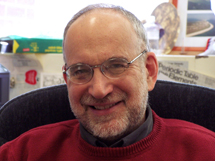NASA Award Helps Doctoral Student Develop Space-Structure Composite Materials
Second-year graduate student Andrea Hoe grew up designing and building projects with her father in their backyard. She also loved spending time with her family surveying the night sky. As a young child, she wanted to be an astronaut. So,…


 Donald Siegel, professor of Earth Sciences in Syracuse University’s
Donald Siegel, professor of Earth Sciences in Syracuse University’s